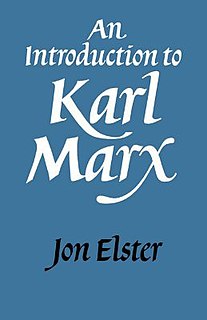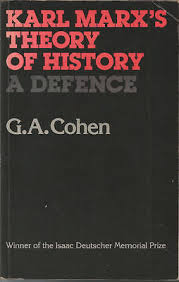
Karl Heinrich Marx was a German philosopher, critic of political economy, economist, historian, sociologist, political theorist, journalist and socialist revolutionary. His best-known titles are the 1848 pamphlet The Communist Manifesto and the four-volume Das Kapital (1867–1883). Marx's political and philosophical thought had enormous influence on subsequent intellectual, economic, and political history. His name has been used as an adjective, a noun, and a school of social theory.

The Open Society and Its Enemies is a work on political philosophy by the philosopher Karl Popper, in which the author presents a "defence of the open society against its enemies", and offers a critique of theories of teleological historicism, according to which history unfolds inexorably according to universal laws. Popper indicts Plato, Hegel, and Marx as totalitarian for relying on historicism to underpin their political philosophies.

Jon Elster is a Norwegian philosopher and political theorist who holds the Robert K. Merton professorship of Social Science at Columbia University.

Critique of Hegel's Philosophy of Right is a manuscript written by the German political philosopher Karl Marx in 1843. Unpublished during his lifetime, it is a manuscript in which Marx comments on excerpts of Georg Wilhelm Friedrich Hegel's 1820 book Elements of the Philosophy of Right that deal with civil society and the state paragraph by paragraph. One of Marx's major criticisms of Hegel in the document is the fact that many of his dialectical arguments begin in abstraction.

Parametric determinism is a Marxist interpretation of the course of history. It was formulated by Ernest Mandel and can be viewed as one variant of Karl Marx's historical materialism or as a philosophy of history.

Main Currents of Marxism: Its Origins, Growth and Dissolution is a work about Marxism by the political philosopher Leszek Kołakowski. Its three volumes in English are The Founders, The Golden Age, and The Breakdown. It was first published in Polish in Paris in 1976, with the English translation appearing in 1978. In 2005, Main Currents of Marxism was republished in a one volume edition, with a new preface and epilogue by Kołakowski. The work was intended to be a "handbook" on Marxism by Kołakowski, who was once an orthodox Marxist but ultimately rejected Marxism. Despite his critical stand toward Marxism, Kołakowski endorsed the philosopher György Lukács's interpretation of the philosopher Karl Marx.

The Theory of Capitalist Development is a 1942 book by the Marxian economist Paul Sweezy, in which the author expounds and defends the labor theory of value. It has received praise as an important work, but Sweezy has also been criticized for misrepresenting Karl Marx's economic theories.

Marx after Sraffa is a 1977 book about Marxist economics by the economist Ian Steedman, in which the author argues against the labor theory of value. Steedman has been criticized for alleged misunderstandings of Karl Marx.

Marx's Concept of Man is a 1961 book about Karl Marx's theory of human nature by the psychoanalyst Erich Fromm. The work sold widely thanks to the popularity of Marx's early writings, which was a product of the existentialism of the 1940s.

The Formation of the Economic Thought of Karl Marx: 1843 to Capital is a 1967 book by the Marxist theorist Ernest Mandel, in which the author discusses the economic theories of Karl Marx. It appeared in English translation in 1971.

An Introduction to Karl Marx is a 1986 book about the philosopher Karl Marx by the social and political theorist Jon Elster. It is a much shorter version of Elster's Making Sense of Marx, published a year earlier.

A General Theory of Exploitation and Class is a 1982 book about the exploitation of labour and social class by the economist and political scientist John Roemer. The book was first published in the United States by Harvard University Press.

Analyzing Marx: Morality, Power and History is a 1984 book about the philosopher Karl Marx by the political philosopher Richard W. Miller.

Marxist humanism is an international body of thought and political action rooted in an interpretation of the works of Karl Marx. It is an investigation into "what human nature consists of and what sort of society would be most conducive to human thriving" from a critical perspective rooted in Marxist philosophy. Marxist humanists argue that Marx himself was concerned with investigating similar questions.

Karl Marx's Theory of History: A Defence is a 1978 book by the philosopher G. A. Cohen, the culmination of his attempts to reformulate Karl Marx's doctrines of alienation, exploitation, and historical materialism. Cohen, who interprets Marxism as a scientific theory of history, applies the techniques of analytic philosophy to the elucidation and defence of Marx's materialist conception of history.

The correct place of Karl Marx's early writings within his system as a whole has been a matter of great controversy. Some believe there is a break in Marx's development that divides his thought into two periods: the "Young Marx" is said to be a thinker who deals with the problem of alienation, while the "Mature Marx" is said to aspire to a scientific socialism.

Analytical Marxism is an approach to Marxist theory that was prominent amongst English-speaking philosophers and social scientists during the 1980s.

The Economic and Philosophic Manuscripts of 1844, also referred to as the Paris Manuscripts or as the 1844 Manuscripts, are a series of notes written between April and August 1844 by Karl Marx, published posthumously in 1932.

The Grundrisse der Kritik der Politischen Ökonomie is an unfinished manuscript by the German philosopher Karl Marx. The series of seven notebooks was rough-drafted by Marx, chiefly for purposes of self-clarification, during the winter of 1857–8. Left aside by Marx in 1858, it remained unpublished until 1939.

History and Class Consciousness: Studies in Marxist Dialectics is a 1923 book by the Hungarian philosopher György Lukács, in which the author re-emphasizes the philosopher Georg Wilhelm Friedrich Hegel's influence on the philosopher Karl Marx, analyzes the concept of "class consciousness," and attempts a philosophical justification of Bolshevism.


















